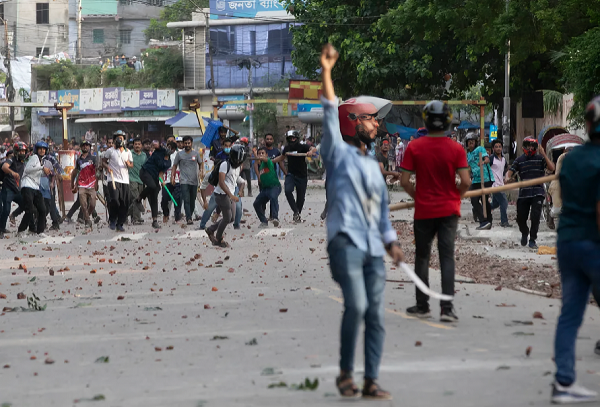Follow us on Facebook
The Quota Dilemma: Bangladesh Erupts as Student Protests Escalate
In a nation wrestling with its historical complexities and the aspirations of its youth, Bangladesh finds itself embroiled in an escalating crisis as student protests over government job quotas have erupted into chaos, resulting in at least 100 injuries. The streets have become battlegrounds, with police deploying tear gas and baton charges against demonstrators opposing a quota system that reserves over half of lucrative civil service positions for specific groups, including children of 1971 war veterans.
The violence erupted on Monday across campuses nationwide, with Jahangirnagar University in Savar, near Dhaka, emerging as a focal point. Here, protesters demanded an end to quotas for war veterans' families, a simmering issue in Bangladesh's socio-political landscape.
Eyewitnesses and police reports describe scenes of chaos and brutality, as anti-quota protesters clashed for hours with students supporting the ruling Awami League party at Dhaka University. Stones, sticks, and iron rods were used as weapons, leaving a trail of injuries and bloodshed.

The quota system, a contentious legacy of Bangladesh's turbulent past, not only reserves positions for descendants of independence war heroes but also allocates quotas for women, disabled individuals, and ethnic minorities. Its suspension in 2018 triggered similar protests, and a recent High Court ruling to reinstate the 30 percent quota for veterans' descendants has reignited discontent.
While protesters support the 6 percent quota for disabled and ethnic minority groups, they vehemently oppose quotas for war heroes' descendants. In an attempt to calm tensions, the Supreme Court recently halted the High Court's order for four weeks, urging protesters to return to classes while awaiting a final decision.

Prime Minister Sheikh Hasina, whose Awami League party maintains a firm grip after a contentious election boycotted by the main opposition, has deferred the issue to the Supreme Court. Her party strongly supports retaining quotas for war heroes' families, rooted in its history as the leader of Bangladesh's independence war under Sheikh Mujibur Rahman.
As Bangladesh grapples with the aftermath of clashes, Enam Medical College Hospital near Jahangirnagar University treats over 50 individuals, with at least 30 suffering pellet wounds. Protesters accuse the Bangladesh Chhatra League, the Awami League's student wing, of disrupting their peaceful demonstrations, while police claim they responded to attacks with tear gas and "blank rounds."
The quota crisis gripping Bangladesh weaves a complex tapestry of history, nationalism, and youth aspirations for equal opportunity. As the nation braces for further protests, the path forward remains uncertain, hinging on the Supreme Court's decision to either quell or intensify unrest. The resolution of this crisis will undoubtedly shape Bangladesh's future, as it navigates its past ghosts and the demands of a new generation striving for a fairer society.



